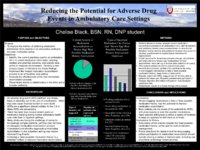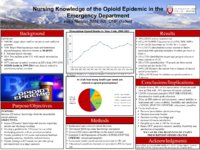The Graduate Nursing Project collection includes Doctor of Nursing Practice (DNP) Scholarly Projects and Master's students' non-thesis projects submitted as part of program requirements.
TO
Filters: Relation Is Part Of: "Graduate Nursing Project, Doctor of Nursing Practice, DNP" Collection: "ehsl_gradnu" Subject: "Drug Overdose"
1 - 25 of 15
| Title | Creator | Date | Description | Relation Is Part Of | ||
|---|---|---|---|---|---|---|
| 1 |
 |
Implementation of a Benzodiazepine Clinical Practice Guideline in an Outpatient Mental Health Setting | Jolley, Dana | 2019 | In the treatment of mental health disorders, the use of benzodiazepines is increasingly falling out of favor due to rising evidence concerning the risk of abuse and dependence. Despite the evidence against such use of benzodiazepines, there is a lack of provider-focused intervention designed to disc... | Graduate Nursing Project, Doctor of Nursing Practice, DNP |
| 2 |
 |
Naloxone Prescribing Education for Health Care Providers in a Rural Setting | Robbins, Emily | 2018 | POSTER | Graduate Nursing Project, Doctor of Nursing Practice, DNP |
| 3 |
 |
Utah's Opioid Overdose Epidemic: Co-prescribing Naloxone for Long-term Opioid Users | Brearton, Klinton L. | 2018 | Background: Accidental opioid overdose is the leading cause of injury deaths in the state of Utah, even surpassing motor vehicle accidents. On average, 52 Utah adults die every month from drug poisoning. Currently, Utah is ranked 7th highest in the nation for opioid related overdoses. Co-prescribing... | Graduate Nursing Project, Doctor of Nursing Practice, DNP |
| 4 |
 |
Effectiveness of an Educational Intervention to Increase Naloxone Prescribing Practices Among Rural Providers to Decrease the Death Rate from Opiate Overdose | Robbins, Emily | 2018 | Background: The death rate from opiate overdoses has exploded into what health officials call an epidemic. Nationwide, over 42,000 opiate overdose deaths occurred in 2016 with 40% of those being attributed to prescribed opiates. Between 2015-2016, there was a 10% increase in the death rate from pres... | Graduate Nursing Project, Doctor of Nursing Practice, DNP |
| 5 |
 |
Improving Cannabidiol Education for Mental Health Providers | Brown, Kristen | 2018 | Decreased life expectancy in the US is associated with rising prevalence rates of opioid and benzodiazepine abuse in this country (Dowell, Arias, & Kochanek, 2017). The increase of overdose deaths associated with rising rates of opiate and benzodiazepine abuse necessitates alternative and complement... | Graduate Nursing Project, Doctor of Nursing Practice, DNP |
| 6 |
 |
Nursing Knowledge of the Opioid Epidemic in the Emergency Department | Nielson, Heidi A. | 2018 | Opioid abuse in society dates back as far as 3400 BC when the poppy plant, otherwise known as opium, was used for medicinal and recreational purposes. As society evolved so did the abuse of opioids, including prescription opioids. This evolution brings us to today's national opioid epidemic and glob... | Graduate Nursing Project, Doctor of Nursing Practice, DNP |
| 7 |
 |
Reducing the Potential for Adverse Drug Events in Ambulatory Care Settings | Black, Chelise | 2017 | POSTER | Graduate Nursing Project, Doctor of Nursing Practice, DNP |
| 8 |
 |
Layperson Naloxone Education and Our Opioid Overdose Epidemic | Noyes, Tiffany | 2017 | POSTER | Graduate Nursing Project, Doctor of Nursing Practice, DNP |
| 9 |
 |
Nursing Knowledge of the Opioid Epidemic in the Emergency Department | Nielson, Heidi A. | 2017 | POSTER | Graduate Nursing Project, Doctor of Nursing Practice, DNP |
| 10 |
 |
Development of an Opioid Guideline for Emergency Department Providers | Ericksen, Nicole | 2017 | The United States (U.S) is currently facing an opioid epidemic. Along with high addiction and death rates, Emergency Departments (ED) across the nation have been adversely affected by this epidemic. Individuals who use opioid medications, such as oxycodone, hydrocodone and oxycontin are four times m... | Graduate Nursing Project, Doctor of Nursing Practice, DNP |
| 11 |
 |
Reducing the Potential for Adverse Drug Events in Ambulatory Care Settings | Black, Chelise | 2017 | Adverse Drug Events (ADEs) are a significant clinical problem in the United States; many are preventable if a provider has full knowledge of patients' medications. The process of gathering medication information is known as medication reconciliation. There is currently an inadequate focus on medicat... | Graduate Nursing Project, Doctor of Nursing Practice, DNP |
| 12 |
 |
Layperson Naloxone Education | Noyes, Tiffany | 2017 | The Centers for Disease Control and Prevention (CDC) announced that the opioid overdose crisis is now a nationwide epidemic, with over 60% of overdoses being unintentional. Although many overdoses are from illegal opiates such as heroin, chronic pain patients taking prescription painkillers experien... | Graduate Nursing Project, Doctor of Nursing Practice, DNP |
| 13 |
 |
Implementing a Revised Controlled Medication Protocol | Hoffman, Sarah A. | 2015 | Prescription drug abuse (PDA) in Utah continues to be at an epidemic level, which has many widespread ramifications, including a huge financial burden placed on the United States economy, and the healthcare system as a whole (Trust for America's Health, 2013). Healthcare providers play an important ... | Graduate Nursing Project, Doctor of Nursing Practice, DNP |
| 14 |
 |
Evaluation of an Interdisciplinary Approach to Treating Chronic Pain in Women Veterans at a Veterans Administration Medical Center | Houskeeper, Karla | 2014 | Primary care providers are often uneducated on how to effectively treat and manage chronic pain, yet they prescribe 20 percent of all narcotics given for pain (Manubay, Muchow & Sullivan, 2011). Managing chronic pain with an interdisciplinary approach is a more successful treatment, especially as na... | Graduate Nursing Project, Doctor of Nursing Practice, DNP |
| 15 |
 |
Improving Opioid Prescribing to Limit Potential for Non-Medical Opioid Use | Simons, Jennifer A. | 2013 | Prescription drug abuse is a significant problem, and is the fastest growing [drug] problem in the United States. More individuals use prescription drugs than heroin and cocaine combined. The increase in non-medical opioid use is directly correlate with the rate of opioid overdose death, which has i... | Graduate Nursing Project, Doctor of Nursing Practice, DNP |
1 - 25 of 15
